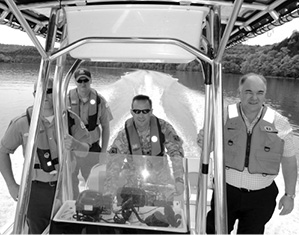Don’t allow tragedy to drown out fond memories at Corps lakes this summer

With the 2012 recreation season already underway, I want everyone to know that “Water Safety” is extremely important to me and to everyone who serves the public in the Nashville District.
Last year there were 19 fatalities on the 10 lakes the district operates on the Cumberland River and its tributaries in Kentucky and Tennessee. Despite the fact we hosted 32,499,829 visitors between October 2010 and September 2011, even one death at a U.S. Army Corps of Engineers lake is too many in my view!
There has already been one fatality during the 2012 recreation season. So I want to do everything I can to draw attention to water safety and provide some key tips that everyone in the public should be aware of before heading out to recreate on any lake, river or body of water.
Knowing what to do to safeguard loved ones around water is vital for this reason. Of the 19 recorded deaths on Nashville District lakes last fiscal year, nearly half were directly attributable to not making good decisions.
Some of the accidents involved taking risks such as drinking alcohol, swimming long distances, diving into shallow water, or boating at high speeds. In most cases the victims did not wear their life jackets.
This recreation season I want men, women and children of all ages to seriously think about water safety and take steps to reduce the risk of tragedy. I would also note that men age 18-55 fall into the highest fatality statistic because they often take risks. Despite this, anyone can be a victim regardless of age, and it only takes 20 seconds for a child to drown, and 60 seconds for an adult to drown.
The best thing anyone can do to remain safe is to wear a Coast Guard approved life jacket and not an inflatable toy to keep safe. Never swim alone, and swim in designated areas. Know your limits and never be influenced or swayed by peer pressure to exceed them or to take any unwarranted risks in and around the water. Even great swimmers drown when they make poor decisions and take risks such as attempting to swim long distances.
When boating, remember to always wear life jackets. It’s too late to put them on after an accident has occurred and passengers have been ejected.
Boating near a dam also has risks. Remember never to anchor the boat. Adhere to all buoys, sirens, signs, ropes, and navigational aids and, again, always wear your life jacket. Water at dams can quickly rise and currents can strengthen with little notice. A boat can be pulled toward the dam, flipped, and capsized, trapping people underwater. Always use extreme caution near a dam, even if just fishing from the shoreline.
Alcohol, boating and swimming don’t mix. Nearly 50 percent of all accidents on the water each year are the result of alcohol consumption. When you add long hours in the sun, vibration, noise and motor fumes, it only intensifies the effects of alcohol on judgment, balance, vision and reflexes.
When operating a boat, also be courteous and use good judgment. Slow down when passing other vessels, fishermen, swimmers or anyone who might be unaware of your presence in the area. Never stop and swim in busy navigational channels or around boat ramps or courtesy floats.
Nearly 700 people drown each year nationwide from recreational boating accidents. It’s imperative that everyone wear a life jacket when recreating in and around the water.
I know some people think it’s not cool or even uncomfortable to wear them, but there are options available today that helps with these misconceptions. There are cooler, sleeker and much more comfortable inflatable life jackets that have the ability to turn an unconscious person face up in the water.
Although people ages 16 and under and non swimmers are not authorized to wear inflatable life jackets, it is a great option for those who can. And they are great for playing it safe during this summer’s recreation season.
Keep youngsters safe by having them wear a proper-fitting Coast Guard approved life jacket for when they venture into the water.
Don’t know how and when to wear a life jacket? Stop, and ask questions. Get it right before entering the water. Park rangers at the lakes are there to assist visitors with their questions and they want to help with water safety issues that the public might encounter. Seek them out and give them an opportunity to assist. It’s better to be sure about something before making a snap and unsafe decision that could turn into tragedy.
Please visit Corps lakes and have fun. But be safe doing it. I want every visitor to have fond memories when returning home.
Best wishes for a safe summer,
Lt. Col. James A. DeLapp
Commander,
Nashville District
U.S. Army Corps of
Engineers
Lt. Col. James A. DeLapp, U.S. Army Corps of Engineers Nashville District commander, pilots a Corps boat at Cordell Hull Lake on the Cumberland River, April 13, 2012. The commander wants to stress water safety and for everyone to wear their life jackets during the 2012 recreation season. (USACE photo by Joanne Mann)
